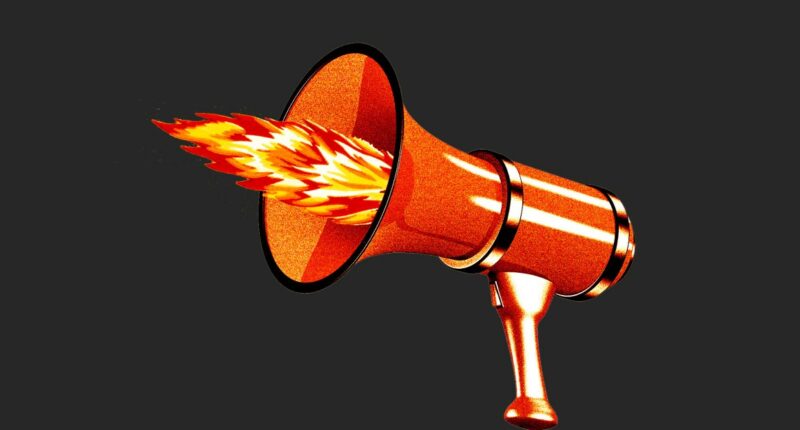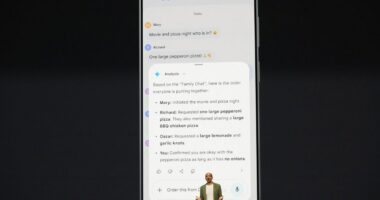Share this @internewscast.com
Just over a week following the publicized murder of right-wing activist Charlie Kirk at a Utah university, incidents of restricting speech in the name of defending free speech enthusiasts are on the rise.
Police have detained the alleged shooter, Tyler Robinson, a 22-year-old Utah resident. Prosecutors claim he was in a relationship with a transgender woman and opposed Kirk’s views. Utah Governor Spencer Cox mentioned that authorities believe Robinson acted independently and do not foresee additional arrests.
However, to many of Kirk’s associates and supporters, critics of Kirk or left-leaning individuals, in general, are held accountable for the incident. Influential figures, including former President Donald Trump, have speculated, without proof, about whole groups backing a movement of political violence against personalities like the co-founder of Turning Point USA. These allegations have led to governmental pressure on social media platforms to suspend users over their expressions, calls for broadcasters to remove comedians lest they face scrutiny, and organized efforts to dismiss public and private sector employees for making comments perceived as insufficiently supportive regarding Kirk’s life and death, even if they denounce political violence.
“There are societal boundaries to the freedom of speech,” noted Rep. Clay Higgins (R-LA) on X on Sunday. “We the People are reminding our fellow citizens that certain speech will not be tolerated, and conducting oneself freely within the framework of our society necessitates some basic decency, as defined by our traditional beliefs.” He had recently vowed to employ Congressional authority and influence over major tech platforms to enforce a lifetime ban on any post or commenter discrediting the assassination of Charlie Kirk.
“People are reminding our fellow citizens that some speech will not be tolerated”
Earlier in the week, Disney and ABC temporarily suspended Jimmy Kimmel Live! after FCC Chair Brendan Carr warned local broadcasters about license reviews if they failed to address a brief late-night comment on the ideology of Kirk’s assailant. Mike Pence, Trump’s former vice president, stated that the First Amendment “does not safeguard entertainers who make vulgar or senseless remarks,” and that “private employers have the full right to dismiss staff” not adhering to their standards.
While employers indeed have the authority to terminate employees for conduct breaches, government threats cross a line. Trump hinted that this tactic could extend beyond Kimmel’s show, suggesting that broadcast networks predominantly airing negative news about him might risk losing their licenses.
Even before this latest incident, the Trump administration had already taken unusual steps to pressure private businesses — such as media companies it disagreed with — including forcing a $16 million settlement with Paramount before approving a major merger. Under Carr, the FCC has opened investigations into several major broadcasters over their diversity, equity, and inclusion (DEI) efforts, which some legal experts say could trample on those companies’ First Amendment rights. This week, Trump filed a $15 billion defamation lawsuit against The New York Times, accusing it of being a “virtual mouthpiece” for Democrats, which a Times spokesperson told CNN, “lacks any legitimate legal claims and instead is an attempt to stifle and discourage independent reporting.” A judge rejected the lawsuit on Friday as “decidedly improper and impermissible.”
JD Vance brushed off concerns from what he called “the crazies on the far left”
There are ominous signs this campaign will only expand. Earlier in the week, Attorney General Pam Bondi said in a podcast interview that the Justice Department would “go after” people “targeting anyone with hate speech,” even though Kirk himself had said, “Hate speech does not exist legally in America,” and that even “evil speech” is protected under the First Amendment. (Bondi later clarified, “Hate speech that crosses the line into threats of violence is NOT protected by the First Amendment.”)
Hosting Kirk’s podcast on Monday, Vice President JD Vance brushed off concerns from what he called “the crazies on the far left,” who fear the administration wants to target constitutionally protected speech. “No, no, no,” he insisted, “we’re going to go after the NGO [non-governmental organization] network that foments, facilitates and engages in violence.”
Though public figures on both sides of the aisle have become the targets of political violence in recent years — including a Democratic Minnesota state lawmaker, the husband of the former Democratic speaker of the House, and a Republican House lawmaker — Vance said the issue “is not a both-sides problem. If both sides have a problem, one side has a much bigger and malignant problem, and that is the truth we must be told.” Trump denied calling political violence an issue on one side of the ideological spectrum, but said, “The radical left causes tremendous violence, and they seem to do it in a bigger way,” CBS reported. A study that used to be on the Justice Department’s website found that the “number of far-right attacks” surpasses “all other types of terrorism and domestic violent extremism” — but reporters noticed this month that it was taken down.
Trump said this week that he plans to designate antifa — an unstructured anti-fascist movement — as a terrorist organization. On top of the danger of targeting a nebulous group of individuals based on shared general beliefs, legal experts note that stringent sanctions are historically reserved for foreign, not domestic, entities — if Trump attempts to impose serious punishments on his enemies for “membership,” he would break that precedent.
Republicans have positioned their actions as a tit-for-tat revenge on liberals who engaged in “cancel culture” — or nongovernmental public shaming campaigns — while blurring or demolishing the line between criticism and government censorship. But the Trump administration has painted an ominous picture of the future — and it shows no sign of letting up.
0 Comments





